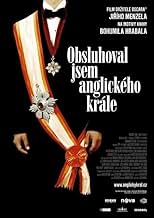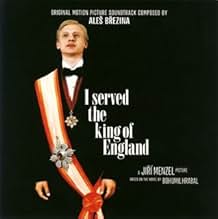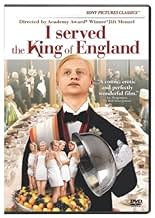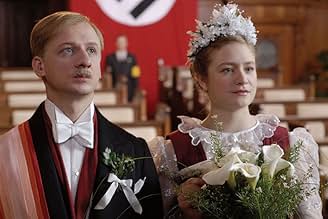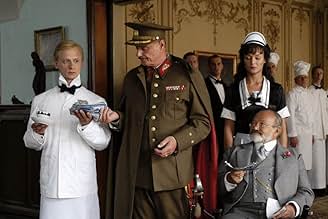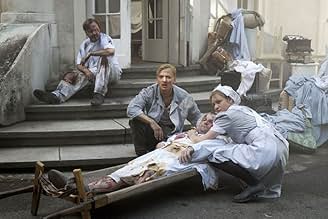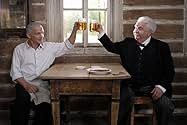IMDb RATING
7.3/10
8.4K
YOUR RATING
A look at the glamorous life at an old-world Prague hotel.A look at the glamorous life at an old-world Prague hotel.A look at the glamorous life at an old-world Prague hotel.
- Awards
- 12 wins & 13 nominations total
- Director
- Writers
- All cast & crew
- Production, box office & more at IMDbPro
Featured reviews
While filming a novel is always difficult.. I think this film captures the spirit of the novel.. one man' life as he succeeds and fails and survives and never seems to be really touched by the world events happening around him (the story starts in 1920's and ends mid-1960's) The actors are perfectly cast, especially the two actors playing Jan Dite. The cinematography is wonderful, as is the music. I have read the novel and I live in the Czech Republic, so I have familiarity with both the story and the culture, but I think the story is universal enough for all audiences to enjoy this film.
This is one of the biggest budget Czech films ever and you can see ALL of the money on the screen, costumes, sets and locations (including the beautiful Hotel Parziz in Prague, which is unchanged from when it was built!)
highly recommend this film to anyone who loves melancholy, sweet stories with a bit of political commentary thrown in for good measure....
This is one of the biggest budget Czech films ever and you can see ALL of the money on the screen, costumes, sets and locations (including the beautiful Hotel Parziz in Prague, which is unchanged from when it was built!)
highly recommend this film to anyone who loves melancholy, sweet stories with a bit of political commentary thrown in for good measure....
Menzel's film is a modern masterpiece. It tells the story of one man's fate, as seen through the mythical pen of Bohumil Hrabal, one of the greatest Czech writers of the 20th century. The film is interspersed with documentary footage of the occupation of the remnants of the Czech republic in 1939. It tells how one man grows up in one system, survives another, and willingly submits himself to a third (Communist). The slogan "my happiness was always in the fact that some unhappiness overtook me" belongs to the East European theater of the absurd. For those of you who have seen the amazing performance of Julia Jentsch in "Sophie Scholl - The Last Days" it will come as a surprise, if not a shock, to see Ms. Jentsch play a character exactly opposite to the one which brought her such fame -- a true blue Nazi! But that's what great actors are made of -- anti-Nazi heroine this year, Nazi lover of the main protagonist the next. She learned some Czech for this role, but when she speaks in German, the screen shows Czech subtitles. Some scenes are really priceless, as when Dite is escorted out of his hotel (presumably in 1948), by two members of the Communist people's militia who at first are inclined to allow him to stay on as administrator of his now nationalized enterprise, but when he keeps insisting he is a millionaire and needs to be arrested, they willingly oblige. Irony stays with us through the film, starting with the opening scene when the elder Dite is released from a Communist jail in Prague and he explains: "I was sentenced to 15 years (for being a millionaire), but because of the amnesty, I only had to sit for 14 and 3/4."
Obsluhoval jsem anglického krále (Jiří Menzel, 2006, 2h00) is very hard a movie to write on. Obviously, Bohumil Hrabal squares things up with Czech history or nationalism. His main character, brilliantly set up by Jiří Menzel (let's remember "Trains closely watched" and "The Aventures of private Ivan Tchonkin") is a sort of naive though ambitious petty crook, almost reaching his aim transformed into an ideal (becoming a millionaire) until History catch him back, after February 1948.
An older man, though not broken, is opening the movie : Jan is freed after serving 15 years ("which, thanks to amnesty, became 14 years and 9 months") in state prison. We follow older Jan Dite in Sudentenland, now a desert since Germans were expelled after WWII. He remembers his rise - mainly through women, generally whores, caring with him because his charm et his sweetness and invention in bed. This is the center of numerous flash-backs making the bigger part of the film. Nothing wrong to say about musical score, special effects (delicate and charming), casting (all women are beautiful), acting, filming and editing. Everything works, no flaws.
The problem, if there is a problem, lies in the hero and almost all of the characters he is mixed with : all are of a rather repulsively vulgar cynicism, which becomes the philosophy Jan uses to transform his first poor dream into an ideal. And those who are not of this kind are lead by nationalism - narrow minded (the Czechs) or hideous (the Nazi school-mistress Jan falls for). Oddly enough, the only one redeemed for us is the head waiter in Hotel Paris, who is Czech, righteous and courageous. Is it to tone down Hrabal's thesis?
So the whole story looks like an enormous bitter (and sophisticated) farce Menzel filmed on behalf of Hrabal's feelings.
Besides, there is still something in the movie, which make its vision not one-sided : a bitter-sweet taste given by the face of mature if not old men in front of women beauty, and the visible and overwhelming nostalgia this beauty vivify in their mind. They remember, and they smile... Isn't it there some kind of a sketch, the sketch of a how-to-grow-old handbook?
An older man, though not broken, is opening the movie : Jan is freed after serving 15 years ("which, thanks to amnesty, became 14 years and 9 months") in state prison. We follow older Jan Dite in Sudentenland, now a desert since Germans were expelled after WWII. He remembers his rise - mainly through women, generally whores, caring with him because his charm et his sweetness and invention in bed. This is the center of numerous flash-backs making the bigger part of the film. Nothing wrong to say about musical score, special effects (delicate and charming), casting (all women are beautiful), acting, filming and editing. Everything works, no flaws.
The problem, if there is a problem, lies in the hero and almost all of the characters he is mixed with : all are of a rather repulsively vulgar cynicism, which becomes the philosophy Jan uses to transform his first poor dream into an ideal. And those who are not of this kind are lead by nationalism - narrow minded (the Czechs) or hideous (the Nazi school-mistress Jan falls for). Oddly enough, the only one redeemed for us is the head waiter in Hotel Paris, who is Czech, righteous and courageous. Is it to tone down Hrabal's thesis?
So the whole story looks like an enormous bitter (and sophisticated) farce Menzel filmed on behalf of Hrabal's feelings.
Besides, there is still something in the movie, which make its vision not one-sided : a bitter-sweet taste given by the face of mature if not old men in front of women beauty, and the visible and overwhelming nostalgia this beauty vivify in their mind. They remember, and they smile... Isn't it there some kind of a sketch, the sketch of a how-to-grow-old handbook?
this is a farce in part, but i do wonder why there's the great American need to qualify this movie. so one will know the correct response, perhaps? aw, just sit back and be enlightened. if more folks had laughed at the Nazis they wouldn't have made it into power. and as for the woman being portrayed as lesser than the man, this is called history, folks. the movie is charming. barney is a mime's delight. and the sex is delicious, and certainly not raunchy as one reviewer on the DVD writes. i always find it stimulating to have to curb my love of MTV editing and car chases and to let the different pace of the European style wash over me. ah tempora, ah mores.
10sjbrook1
Like the butler played by Anthony Hopkins in the 1994 film "The Remains of the Day", the waiter at the centre of "I Served the King of England" (Jiri Menzel, Czech Republic, 2006) is not interested in politics. Major historical events surround him, yet these completely escape his attention. His ambition is simply to become a millionaire, like the fat cats he serves at table. In 1930s Prague, Hitler, in Berlin, is making a radio announcement about his aim to "liberate" the Sudetenland. Bored, Jan Dite, the waiter, simply turns the dial to a dance music station.
He manages to float through the Nazi invasion, first of the Sudetenland, then of Czechoslovakia. By a combination of hook and crook, he achieves his ambition of owning his own hotel through the sale of valuable stamps, stolen from a vanished Jewish family. This does not give him a moment's pause but later, when he sees a trainload of Jews in cattle-cars moving off to Auschwitz, he has a rush of compassion and chases after the train in an attempt to hand the deportees a sandwich. After the war, as a self-confessed millionaire, he is sent to prison when his hotel is nationalised. He emerges fifteen years later, older, but not much wiser. He is Schweik, but without the latter's sly intelligence.
This sketchy summary cannot do justice to a film which has been described as a near-flawless masterpiece, in which "Prague has never looked better". It is permeated with the ironic wit which marked Menzel's earlier films, such as the Academy Award winning Closely Watched Trains (1966). Dite befriends the German girl Liza, described by one reviewer as "the sweetest little Nazi in the history of the cinema". They are in bed, making love in the missionary position. Liza keeps pushing his head aside so that she can gaze at the big picture of Adolf Hitler on the opposite wall. Such was love in the Third Reich. The scene in which Dite is undergoing a racial fitness test which involves giving a sperm sample is intercut with young Czech men being unloaded from a lorry at an execution ground. Of this, Dite is blissfully unaware.
The Remains of the Day was based on a serious and perceptive novel by Kazuo Ishiguro. The genesis of I Served the King of England, by contrast, was a comic novel by Bohumil Hrabal, a book I cannot wait to get my hands on. Any offers?
He manages to float through the Nazi invasion, first of the Sudetenland, then of Czechoslovakia. By a combination of hook and crook, he achieves his ambition of owning his own hotel through the sale of valuable stamps, stolen from a vanished Jewish family. This does not give him a moment's pause but later, when he sees a trainload of Jews in cattle-cars moving off to Auschwitz, he has a rush of compassion and chases after the train in an attempt to hand the deportees a sandwich. After the war, as a self-confessed millionaire, he is sent to prison when his hotel is nationalised. He emerges fifteen years later, older, but not much wiser. He is Schweik, but without the latter's sly intelligence.
This sketchy summary cannot do justice to a film which has been described as a near-flawless masterpiece, in which "Prague has never looked better". It is permeated with the ironic wit which marked Menzel's earlier films, such as the Academy Award winning Closely Watched Trains (1966). Dite befriends the German girl Liza, described by one reviewer as "the sweetest little Nazi in the history of the cinema". They are in bed, making love in the missionary position. Liza keeps pushing his head aside so that she can gaze at the big picture of Adolf Hitler on the opposite wall. Such was love in the Third Reich. The scene in which Dite is undergoing a racial fitness test which involves giving a sperm sample is intercut with young Czech men being unloaded from a lorry at an execution ground. Of this, Dite is blissfully unaware.
The Remains of the Day was based on a serious and perceptive novel by Kazuo Ishiguro. The genesis of I Served the King of England, by contrast, was a comic novel by Bohumil Hrabal, a book I cannot wait to get my hands on. Any offers?
Did you know
- TriviaThe scenes for the Hotel Pariz restaurant were filmed in the main restaurant in Prague's Obecni Dum (Civic House), just around the corner from the actual Hotel Pariz. Both restaurants were designed in the Art Nouveau style by artist Alphons Mucha, but the Obecni Dum restaurant is larger.
- GoofsJan sees a train full of people being deported to a concentration camp. A closeup of one of the cars shows men within wearing gray and white striped uniforms. However, deportees were sent to the camps wearing their civilian clothes and weren't issued uniforms until after they arrived.
- Quotes
Jan Díte, older: A person becomes most human, often against his own will, when he begins to founder, when he is derailed and deprived of order.
- ConnectionsEdited into CzechMate: In Search of Jirí Menzel (2018)
- How long is I Served the King of England?Powered by Alexa
Details
- Release date
- Countries of origin
- Official sites
- Languages
- Also known as
- I Served the King of England
- Filming locations
- Production companies
- See more company credits at IMDbPro
Box office
- Budget
- CZK 84,450,000 (estimated)
- Gross US & Canada
- $617,403
- Opening weekend US & Canada
- $53,218
- Aug 31, 2008
- Gross worldwide
- $7,354,478
- Runtime
- 1h 53m(113 min)
- Color
- Sound mix
- Aspect ratio
- 1.85 : 1
Contribute to this page
Suggest an edit or add missing content


